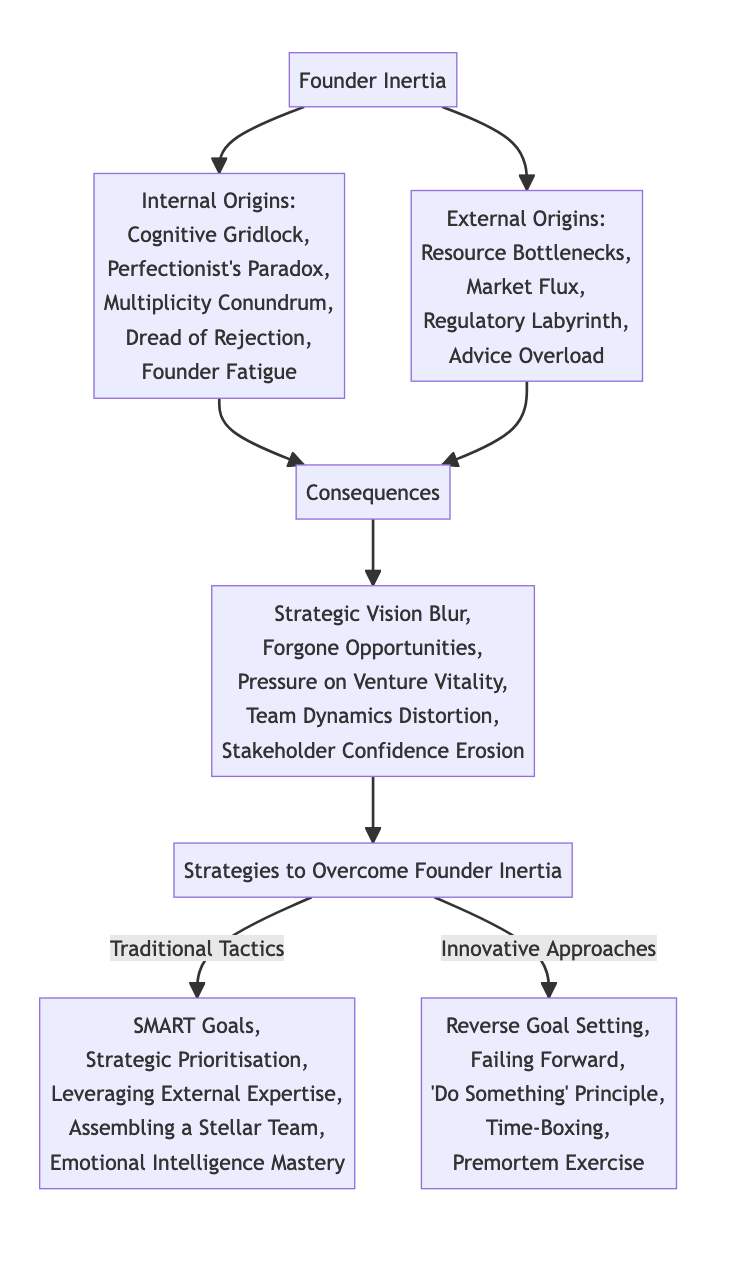If you feel stuck in your startup read on……...If one single idea here helps you, please pass it on; for it can help someone else!!
Photo by Tono Graphy on Unsplash
For entrepreneurs graced with an exceptional intellectual capacity, navigating the business landscape can be likened to an intricate game of chess ♟️, wherein every move demands a strategic balance of logic, intuition, and foresight.
Photo by Nathan Dumlao on Unsplash
However, a curious paradox often presents itself in the form of 'Founder Inertia' – a state of stagnation marked by hesitation and inaction, even amongst the most intellectually robust.
Please allow me to unravel the intricacies of this phenomenon through the lens of high cognitive capability, delving into its influence on your entrepreneurial journey and suggesting efficacious stratagems to counteract it.
What the heck is Founder Inertia?🤔
The Origins – The Internal Dialogue
1. Cognitive Gridlock🧠🔒: Possessing a high intelligence often implies a propensity for comprehensive and profound analysis, which might ironically result in a state of decision paralysis or overthinking. Paralysis by analysis as it is commonly known.
2. The Perfectionist's Paradox⏳🔄🏁: Pursuing flawless strategies and solutions, whilst being an intellectual's second nature, could occasionally obstruct the path to immediate action. As you are producing an outcome and in the process of producing the outcome you are learning something new. Being never satisfied with the final result you scrap it and go back to the drawing board to improve it. Depriving the universe of the benefits of your initial outcome. It is like being caught up in an eternal cycle of improvement without progressing. It is exhausting. Put something out there and then revisit to improve.
3. The Multiplicity Conundrum🔀🤷♂️: An elevated intelligence often correlates with the ability to perceive an expansive spectrum of solutions, which might inadvertently lead to a state of confusion and indecisiveness. There is always an option that you have not considered but here and now is it worth waiting for it?
4. The Dread of Rejection😔🚫: A heightened sense of emotional sensitivity, often accompanying a high intelligence, could escalate the fear of rejection or failure, thereby inhibiting action. If you approve of it to be good enough then it is good. There will always be naysayers and flat-earth protagonists.
5. Founder fatigue😓💤: it is often a burnout of trying to do too many things at the same time or lack of support. Be kind to yourself.
The External Catalysts – Dealing with the world
1. Resource Bottlenecks📉🔗: Limited capital or human resources might restrict the application of ideated strategies, amplifying inertia. Talk to new people. Trust serendipity as often you may be only one step away and you may not know.
2. Market Flux🔄📊: Rapid market shifts could overwhelm even the intellectually superior, causing hesitations and impeding decision-making. Ear’s on the ground at all times and active listening is the key.
3. The Regulatory Labyrinth📚🗂️🔍: Navigating through the complex maze of legal and regulatory frameworks can slow progress, exacerbating inertia. You may not be able to overcome it at all times but I often see founders working through parallel plans, often running multiple scenarios in more than one geography or teams have overcome this challenge.
4. The Universal Askhole Phenomenon and Advice Overload🌐💬💥: An entrepreneur's journey is often fraught with unsolicited advice from those whose understanding of the venture might be lacking or misinformed. You can get bombarded with an overwhelming influx of varying opinions and recommendations. Entrepreneurship may become challenging as you now have to sift through the noise, intensifying founder inertia.
The Ripple Effect: the Consequences of Founder Inertia
The consequences of Founder Inertia are far-reaching:
1. Strategic Vision Blur👀🌫️: Inertia is bound to obfuscate your strategic vision, affecting the directional trajectory of your venture. If you sit at it for too long it will start feeling like a distant dream.
2. Forgone Opportunities🚪⌛: Delayed actions due to inertia can result in missed windows of opportunity in the marketplace. Often you may find someone successfully executing your idea.
3. Pressure on Venture Vitality💔💸: Inertia can hinder achieving financial milestones, posing significant stress on the health and sustainability of the startup. As your fixed costs may stay the same the longer you take the more difficult it may become financially.
4. Team Dynamics Distortion👥💔: Persistent inertia can impact team morale, productivity, and overall dynamics.
5. Stakeholder Confidence Erosion👥👎: A pattern of inaction or delayed decision-making can potentially erode the confidence of stakeholders, including investors, customers, and partners. This may impact your progress the word may spread no one may seem to be complaining while they may be rapidly moving to other resplendent options.
The Classic Combat: some traditional Tactics to get over Founder Inertia
1. SMART Goals Framework🎯✅: Harness your intellectual capacity to construct clear, achievable objectives using this time-tested method. One reason you being a part of an incubator or coach can help is they can keep you accountable.
2. Strategic Prioritisation📝⬆️⬇️: Tools such as the Eisenhower Box can assist in distinguishing between tasks of varying levels of importance and urgency, allowing for focused action. You may consider the book “7 Habits of highly effective people” by Stephen Covey
3. Leveraging External Expertise👥🧠🔄: Draw from diverse perspectives offered by mentors, industry experts, accountability mentors, or consultants, to gain fresh insights and validate your ideas. You seek the advice but pick what you think may be relevant not all advice may apply to what you are seeking.
4. Assembling a Stellar Team🤝🔝: Delegate decision-making to a competent team to reduce cognitive load and foster a culture of shared responsibility. Sometimes you need to a great team to take the edge off or a shoulder to lean on.
5. Emotional Intelligence Mastery🧘♂️📈: Cultivate resilience, stress management, and self-awareness to manage the fear of rejection and anxiety effectively. I would suggest reading the book by Daniel Coleman on the topic.
The Innovative Arsenal: Out of box Approaches to Counteract Founder Inertia
1. Reverse Goal Setting↩️🥅: Clearly outline what you aim to avoid. This 'anti-goal' strategy can help direct your focus and facilitate action. Your focus here is on what to avoid or not do. If cold calling is not your thing, try something else.
2. Embracing the Philosophy of Failing Forward🚀💥👍: View failure as a crucial stepping stone to success and a catalyst for action. As Dr. Wayne Dyer would say - “ don’t let the music die inside you “. You should pursue your dreams irrespective of outcomes for you only control your actions not necessarily the consequences.
3. The 'Do Something' Principle💪🔜: Start small, with any action that aligns with your goal. This can stimulate motivation and build momentum. One ounce of action is worth pounds of theory - Robert Schuller ( Talks about it in his Possibility Thinking - Book ). As -Dr. Martin Luther King Jr. said, “If you can't fly then run, if you can't run walk, if you can't walk crawl, but by all means keep moving.”
4. Time-Boxing Technique⏱️📦: Dedicate specific time slots for decision-making to avert over-analysis and procrastination.
5. Premortem Exercise👁️🔮📝: Anticipate potential points of failure in advance to instigate preventative measures and promote proactive behaviors.
For some, it is going to be sad and inevitable that they will let inertia take over and their dreams will not amount to much until such day they are filled with regret. You do have a choice though to cut through it.
For the intellectually gifted founder, understanding and combating inertia is akin to mastering an advanced strategic game. This intellectual conquest of founder inertia serves not just as a testament to one's cognitive prowess but as a significant stride toward entrepreneurial success.🏆🥇
.
© Sameer Babbar
sbabbar@sameerbabbar.com
Disclaimer: This is for information only. It does not take into account your objectives, financial situation, or needs. The author, his company, his associates, his directors, his staff, his consultants, and his advisors do not accept liability for any loss or damage, including, without limitation, any loss which may arise directly or indirectly from the use of or reliance on the information provided.






